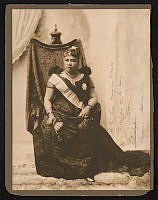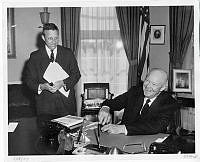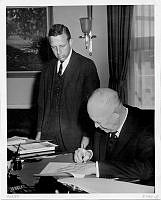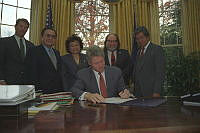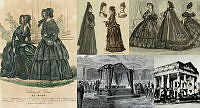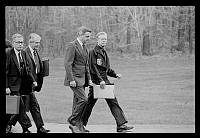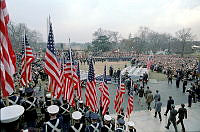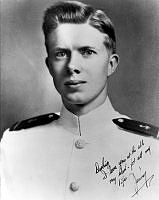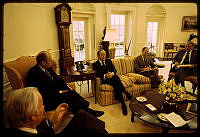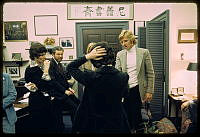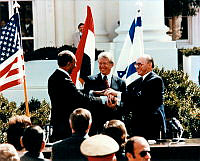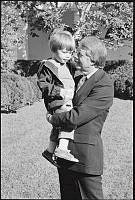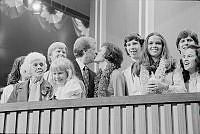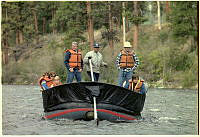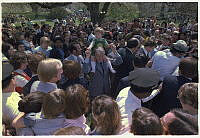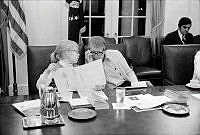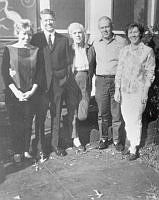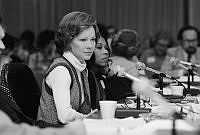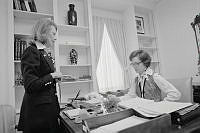John Adams

On April 21, 1789, John Adams became the first Vice President of the United States. Over the next twelve years, John and Abigail followed the federal government as it was relocated from New York City to Philadelphia, and finally to Washington, D.C. The constant sojourning in service to their nation was the defining characteristic of the Adamses’ lives.
Born on October 30, 1735 in Braintree, Massachusetts, John spent his childhood on the family farm. He attended a day school, Latin school, and then started his studies at Harvard when he was fifteen. After rejecting a career as a minister, John worked as a teacher before studying law. Once he established his legal practice, he married Abigail Smith in 1764. Over the next fifty years, they raised four children, traveled around the world, and forged a remarkable partnership.
In October 1770, Adams gained fame after defending the British soldiers who were charged for the Boston Massacre. Four years later, Adams attended the First Continental Congress as a delegate from Massachusetts. He quickly emerged as the leader of the pro-independence faction in Congress and nominated George Washington of Virginia to command the Continental Army. In 1776, he served on the committee to prepare the Declaration of Independence, just one of ninety committees on which he worked.
In 1778, Congress sent Adams to France and then the Netherlands to help secure aid for the war effort. While at The Hague, he obtained a crucial loan and opened the Netherlands to American trade. Adams, along with Benjamin Franklin, John Jay, and Henry Laurens, helped negotiate the Treaty of Paris, which ended the Revolutionary War and recognized independence for the new nation. During this time, Adams returned home to Massachusetts just once and only for a few months in 1779. On this visit, Adams authored the Massachusetts state constitution, the longest running state constitution in the nation.
From 1781 to 1788, Adams served in a variety of formal diplomatic posts, including the first United States Minister to Great Britain. After Adams was elected to the Vice Presidency in 1789, he spent the next eight years in obscurity. In his capacity as second-in-command to Washington, he was largely excluded from cabinet deliberations. As President of the Senate, his contributions were shunned and the senators dubbed Adams “His Rotundity.”
After Washington declared his intention to retire in 1796, the country elected Adams as the second president. In every city that the Adamses lived and served, they formed an official household, welcomed guests, and hired a staff of servants to maintain the home. Unlike the Virginians that came before and after him, Adams did not own enslaved people. Instead, the Adamses hired white and free African-American workers to provide these services. However, that did not mean that they avoided slavery altogether. While the Adamses opposed slavery both morally and politically, they may have hired out enslaved African Americans, paying wages to their owners, to work in the Vice President’s and President’s House. Click here to learn more about the households of President John Adams.
One of Adams’ first acts as president was an attempt to retain Washington’s cabinet secretaries. However, the secretaries took their orders from Alexander Hamilton and worked to undermine Adams’ foreign policy agenda and reelection campaign in 1800. Adams’s presidency was also marred by the Alien and Sedition Acts, which targeted immigrants and political opponents of the Adams administration. On the other hand, Adams avoided war with France, which was his primary diplomatic objective. The Treaty of Mortefontaine, signed in 1800, came too late to help Adams win reelection, but ended the Quasi-War with France and secured a peaceful trade relationship between the two countries.
After Thomas Jefferson won election to the presidency in 1800, Adams returned home to Peacefield, his home in Quincy, Massachusetts. For the next twenty-five years, he maintained a vigorous written correspondence with friends and family, served an elder statesman in Boston, and rejoiced when his eldest son, John Quincy Adams, won the 1824 presidential election. On July 4, 1826, the fiftieth anniversary of the Declaration of Independence, he passed away. Adams’ family recalled later that his last words were: “Thomas Jefferson survives.” Unbeknownst to Adams, Jefferson had died several hours earlier.







